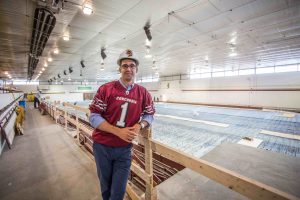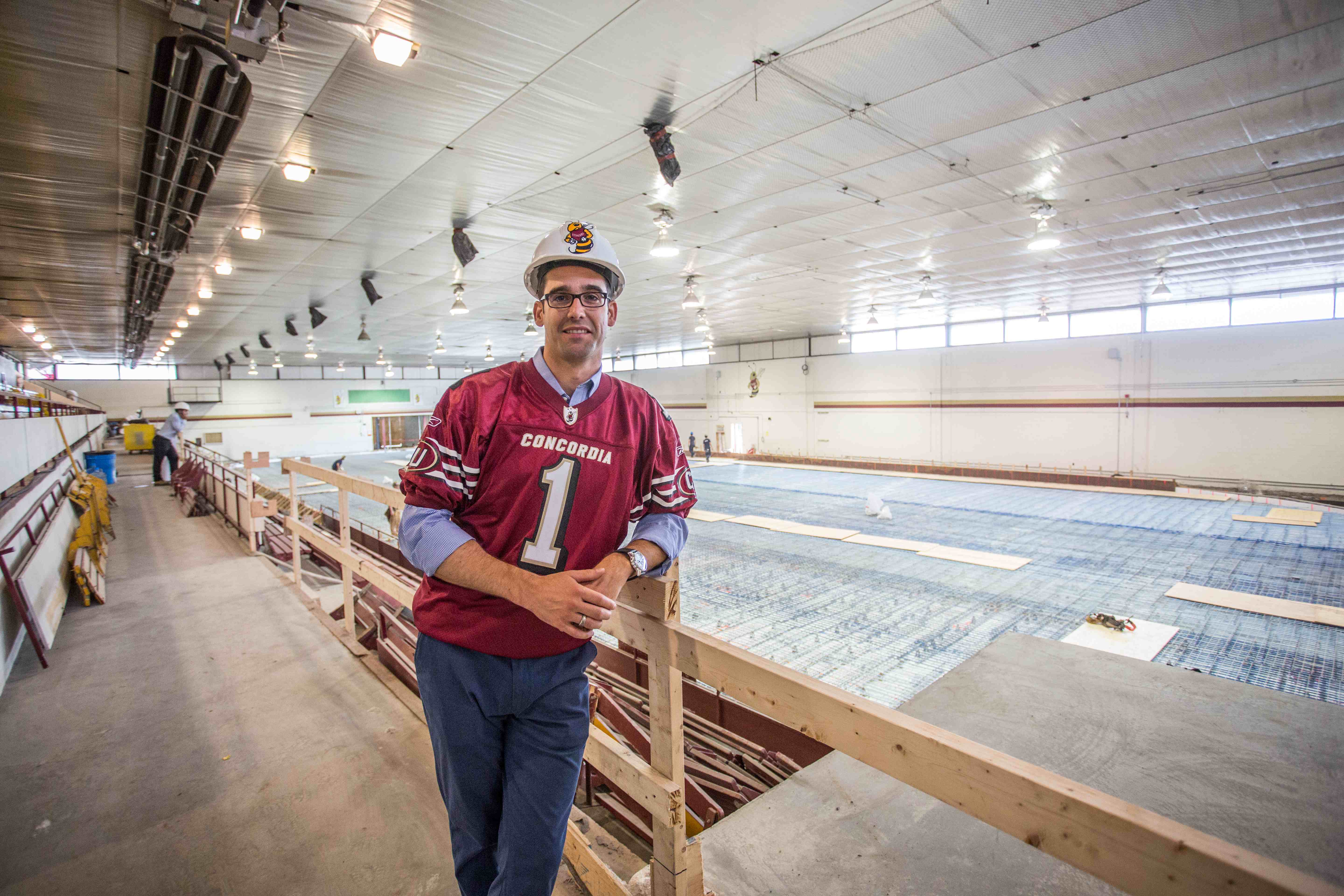If you’re a Montreal Canadiens fan, you’ve probably heard his name before. Now, you’ll be hearing of him a lot more, as Patrick Boivin joins Concordia as the new director of Recreation and Athletics.
Boivin’s athletic career began at the tender age of two, when he learned how to ski before he barely knew how to walk. His father, Pierre, who spent 12 seasons as the president of the Canadiens hockey team, owned a ski business when Boivin was a child and he therefore spent much of his time at ski resorts.

“It was just natural that my mom and I would follow,” said Boivin about his dad’s frequent trips to the mountains. Boivin also played hockey and as he got older, this forced him to come to a decision.
“I skied competitively until I was 13,” he said. “But my parents obligated me to decide between hockey and skiing and I went to hockey. I still play it, two or three times a week, even now.”
As a young man, hockey took the Montreal-native all over North America and Europe. He played junior hockey while studying finance and international business at HEC Montreal and went on a foreign exchange to Aarhus University in Denmark. He played one year of prep hockey while earning his graduate diploma in Connecticut and also played a year of college hockey at the University of Colorado.
“I always had a sense that there was more than just my little backyard in Quebec,” Boivin said of his travels. “When you step out of your comfort zone, whether it’s a new job or moving from one neighbourhood to another or going to another country, I think it challenges you, and it gets you to be a little bit more than who you really are, instead of the person you are when you are very comfortable and have all your safety nets around you.”
Fresh out of school, Boivin got his first job working for the Montreal Canadiens, where he would spend seven seasons between 2002 and 2008 working in the marketing department.
“[When] I started out, I was doing promotion, coordinating for games, mostly handing out prizes and stuff like that,” he said. “Eventually, when I left, I was a director, I was managing all the fan development, all of the grassroots marketing programs, the sponsorship activations.”
He also helped work on some projects that were planned for the club’s centennial anniversary in 2009.
After spending two years working for the NHL in Toronto, then-Canadiens general manager, Pierre Gauthier, brought Boivin back to the organization, this time as director of hockey operations.
“I was essentially a right-hand operational guy to the general manager,” said Boivin. “The general manager obviously operates the whole team but needs to have a higher priority on everything that’s competitive. So everything that’s hockey, whether it’s scouting, whether it’s coaching, the actual performance of the team. The whole flip-side to running a hockey team is that it takes a lot of people and it takes a lot of operational time. Anything that could take up time that could better be used with him focusing solely on the team, that’s what I would do.”
Every young hockey enthusiast dreams of playing in the NHL, while every Montrealer dreams of playing for the Montreal Canadiens. Boivin isn’t any different.
“It’s tough to say [working for the Habs] was a dream come true because I never dreamed of working for the Canadiens,” explained Boivin. “I dreamed about playing for the Canadiens when I was a kid. But it’s such a passionate environment that it really was a dream job.”
And with every job, dream job or not, comes its challenges and its rewards.
“The schedule was tough,” said Boivin. “You never really stop working. It’s seven days a week until midnight, one o’clock in the morning, that you can still be on the phone talking to an agent, talking to a player. I was more or less [always] on call. The very on-demand schedule is tough but you accept and kind of buy into it once you know you will be doing that job.”
Even with the heavy schedule, working those long hours brought forth many learning experiences that Boivin might not have learned anywhere else.
“A lot of [what I was doing] was very new, much like this job is right now. In my third year there, I was still learning a lot of things and I was working in the business for 10, 15 years. So for me, the learning and the quick learning behind it all, the challenges behind managing the salary cap and negotiating player contracts, it kind of all seems dramatic and theatrical when you read it in the papers, but when you’re on the other side of the mirror it’s very interesting and it’s not always as theatrical as RDS or as anyone else points it out. It’s a lot of work, but it’s also very interesting.”
When you think of a hockey team, or any sports team, you think about the players, what kind of money they make and if they have what it takes to win it all. But a huge part of a sports team is what they do for charity as well.
Boivin’s father became president of the Canadiens in 1999. Two years later, in 2001, he founded Montreal Canadiens Children’s Foundation. Since then, the Foundation has raised $10 million “to support 400 Quebec-based organizations dedicated to improving the well-being of sick and underprivileged children,” says the Canadiens website.
As a result of his father’s work in the community, charity work has always been a big part of the Boivin family.
“It’s always been a part of my life, partly through what my parents have done with their own charity work,” Boivin said. “When I was young and didn’t have much else […] on my hands, I just volunteered. Now, I’ve got three or four things that I work on on a yearly basis.”
One of his projects has been the Bleu Blanc Bouge project that was introduced in 2008. Its goal is to build five outdoor refrigerated rinks in less-privileged areas of Montreal.
“[The charity’s focus is] not only on healthy eating but healthy living habits for children but also for children living in some low-income neighbourhoods or on the poverty line,” said Boivin. “Trying to help out children that don’t necessarily have a lot of help. Ice rinks do that. They give them an option to go out and play. It gives them an option to be out and be active.”
Another charity project Boivin has been working on is the Triathlon d’Hiver for the Sainte-Justine Hospital.
“My daughter was born at Sainte-Justine and thankfully everything was okay but I have a couple of friends who haven’t been so lucky,” said Boivin. “Sainte-Justine is not only two blocks away from our house but is also very close to our hearts. My wife is on their fundraising board and they have a winter triathlon [every year where] people come out and do cross-country skiing, skating and running in the middle of February. So I put a team together and we’ve, over the last four years, have managed to raise $25,000 every year.”
After leaving the Canadiens last season, Boivin took a few months off before taking on the role as director of Recreation and Athletics.
Boivin said he took the job because, “The new vision that the higher management, starting with Alan Shepard, have regarding the role of recreation and athletics and how it can be kind of a temple and a kind of a lighthouse for the University.”
“I think a lot of your brand as a university can be helped through recreations and athletics and not just by winning but by having a great program that attracts a lot of people too. I think there is a lot to be said about how students can benefit from a well structured and great massive offerings on the recreational side. People who go out to play basketball, to play soccer and to make a lot of friends and to intertwine the social aspect through sport along with their university life, keeps them engaged for a number of years, even after they’re gone. So that’s what we want to build up.”
Boivin’s biggest job as athletics director will be to bring a championship back to Concordia. For example, the Stingers football team hasn’t won a Championship since 1998, and the last time the men’s hockey team won a conference title was in 1984.
“I won’t be changing [anything], whether it’s football, hockey or anything else, tomorrow,” added Boivin. “[But] I think you need to start by making sure that the people that are in place now have the right resources to be able to succeed. Whether it’s the players, or whether it’s the coaches, or just the staff around. We’ll start by evaluating everything and then it’s about conditioning a winning attitude and [that] takes a little bit of time.”
For now, the best Boivin can do is to see how his teams fare in the early stages of this season; and he’ll start by going to the Stinger’s football team’s home opener on Saturday, Aug. 31st.




